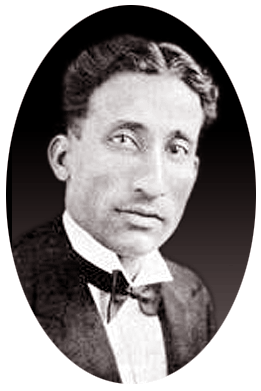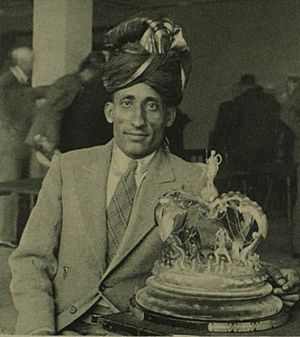Sultan Khan (chess player) facts for kids
Quick facts for kids Sultan Khan |
|
|---|---|
 |
|
| Country | British India (1903–1947) Pakistan (1947–1966) |
| Born | 1903 Mitha Tiwana, Khushab District, British India |
| Died | 25 April 1966 (aged 62–63) Sargodha, Punjab, Pakistan |
Sultan Khan (born 1903 – died April 25, 1966) was a famous chess player from Punjab, which was part of British India and later Pakistan. Many people believe he was the strongest chess player from Asia during his time.
Sultan Khan grew up in a farming family. He traveled to Britain with a wealthy friend, Sir Umar Hayat Khan. There, he surprised everyone with his amazing chess skills. In less than five years (1929–1933), he won the British Chess Championship three times. He also played in tournaments and matches that showed he was among the top ten players in the world.
After his short but brilliant chess career, Sir Umar brought him back home. Sultan Khan stopped playing chess and went back to farming on his family's land in what became Pakistan. He lived there for the rest of his life. Some chess experts say he was one of the most naturally talented players ever. Even though he was very good, the world chess organization (FIDE) never gave him a special title like Grandmaster.
Contents
Sultan Khan's Chess Journey
Sultan Khan was born in 1903 in Mitha Tiwana, a place now in Pakistan. He learned a traditional form of Indian chess from his father when he was nine years old. By the time he was 21, people in Punjab thought he was the best player around.
Sir Umar, his friend, then helped him learn the European version of chess. In 1928, Sultan Khan won the all-India championship. He won eight games, drew one, and didn't lose any.
In 1929, Sir Umar took Sultan Khan to London. A practice tournament was set up for him. Because he was new to European chess and didn't know much about its strategies, he didn't do well at first. He finished last. However, other players helped him learn and get ready for the British Chess Championship that summer. Amazingly, he won the championship! Soon after, he went back to India.
Sultan Khan returned to Europe in 1930. He began an international chess career, beating many of the world's top players. He came in second place at a tournament in Liège in 1930. He also placed third at Hastings in 1930–31, behind future World Champion Max Euwe and former World Champion José Raúl Capablanca. He won the British Championship again in 1932 and 1933. He also won a close match against Savielly Tartakower in 1931.
Sultan Khan played for England three times at the Chess Olympiads, which are like the Olympic Games for chess. At Hamburg in 1930, he played very well. At Prague in 1931, he faced even stronger players but had an excellent score. He beat famous players like Salo Flohr and Akiba Rubinstein. He also drew games with World Champion Alexander Alekhine. In 1933, he played at Folkestone, where he had an even score, winning and losing the same number of games.
In December 1933, Sir Umar took Sultan Khan back to India. After that, he stopped playing chess professionally.
Life After Chess
Sultan Khan's friend, Miss Fatima, who also worked for Sir Umar, won the British Ladies Championship in 1933. She said that when Sultan Khan returned to India, he felt like he had been set free. The damp English weather often made him sick with malaria, colds, and sore throats. He sometimes had to play games with bandages around his neck.
Sir Umar passed away in 1944. Mir Sultan Khan lived the rest of his life with his family in Sargodha, Pakistan. His oldest son, Ather Sultan, remembered that his father didn't teach his children chess. He told them they should do something more useful with their lives.
Sultan Khan died from tuberculosis in Sargodha, Pakistan, on April 25, 1966. His son, Ather Sultan, became an Inspector General of Police in Pakistan. His granddaughter, Dr. Atiyab Sultan, earned a doctorate from the University of Cambridge.
Sultan Khan's Chess Skill
Even though his chess career was short, Sultan Khan quickly became one of the best players in the world. He played equally well against the top players of his time. According to chess expert Arpad Elo, Sultan Khan's skill during his best five years was like having an Elo rating of 2530. This is a very high rating.
In 1950, the world chess organization FIDE started giving out titles like International Grandmaster. By then, Sultan Khan had not played chess for 15 years. Even though FIDE gave titles to some other players who had retired, they never gave a title to Sultan Khan.
Famous Chess Games
- This is one of Sultan Khan's most famous games. He played as White against José Raúl Capablanca at Hastings in 1930–31:
1.Nf3 Nf6 2.d4 b6 3.c4 Bb7 4.Nc3 e6 5.a3 d5 6.cxd5 exd5 7.Bg5 Be7 8.e3 0-0 9.Bd3 Ne4 10.Bf4 Nd7 11.Qc2 f5 12.Nb5 Bd6 13.Nxd6 cxd6 14.h4 Rc8 15.Qb3 Qe7 16.Nd2 Nf6 17.Nxe4 fxe4 18.Be2 Rc6 19.g4 Rfc8 20.g5 Ne8 21.Bg4 Rc1+ 22.Kd2 R8c2+ 23.Qxc2 Rxc2+ 24.Kxc2 Qc7+ 25.Kd2 Qc4 26.Be2 Qb3 27.Rab1 Kf7 28.Rhc1 Ke7 29.Rc3 Qa4 30.b4 Qd7 31.Rbc1 a6 32.Rg1 Qa4 33.Rgc1 Qd7 34.h5 Kd8 35.R1c2 Qh3 36.Kc1 Qh4 37.Kb2 Qh3 38.Rc1 Qh4 39.R3c2 Qh3 40.a4 Qh4 41.Ka3 Qh3 42.Bg3 Qf5 43.Bh4 g6 44.h6 Qd7 45.b5 a5 46.Bg3 Qf5 47.Bf4 Qh3 48.Kb2 Qg2 49.Kb1 Qh3 50.Ka1 Qg2 51.Kb2 Qh3 52.Rg1 Bc8 53.Rc6 Qh4 54.Rgc1 Bg4 55.Bf1 Qh5 56.Re1 Qh1 57.Rec1 Qh5 58.Kc3 Qh4 59.Bg3 Qxg5 60.Kd2 Qh5 61.Rxb6 Ke7 62.Rb7+ Ke6 63.b6 Nf6 64.Bb5 Qh3 65.Rb8 1–0 Black resigned.
- Sultan Khan won this strong game as Black against Victor Soultanbeieff at Liège in 1930:
1.d4 Nf6 2.Nf3 b6 3.c4 e6 4.g3 Bb7 5.Bg2 Bb4+ 6.Bd2 Bxd2+ 7.Nbxd2 0-0 8.0-0 c5 9.Qc2 Nc6 10.dxc5 bxc5 11.e4 Qc7 12.Rfe1 d6 13.Rac1 h6 14.a3 Nd7 15.Qc3 a5 16.Nh4 g5 17.Qe3 Qd8 18.Nhf3 Qe7 19.h3 Rab8 20.b3 Ba8 21.Nb1 Nde5 22.a4 Nxf3+ 23.Bxf3 Nd4 24.Bd1 f5 25.exf5 Rxf5 26.Rc3 Rbf8 27.Rf1 Rf3! 28.Bxf3 Rxf3 0–1 White resigned.
- In this game from Liège 1930, American champion Frank Marshall (Black) tried a tricky move, but Sultan Khan (White) defended calmly:
1. e4 e5 2. d4 exd4 3. Qxd4 Nc6 4. Qe3 Nf6 5. Nc3 Be7 Coles wrote that Sultan Khan chose a risky opening against Marshall, who was known for brilliant attacks. 6. Bd2 d5 7. exd5 Nxd5 8. Nxd5 Qxd5 9. Ne2 Bg4 10. Nf4 Qd7 11. f3 0-0-0 12. 0-0-0 Sultan Khan avoided complicated moves. 12... Rhe8 Marshall tried a piece sacrifice instead of moving his bishop back. 13. fxg4 Bb4 14. Qf2! Sultan Khan didn't fall for a trap. 14... Bc5 15. Qf3! This move allowed his queen to block if Black tried a queen sacrifice. 15... Re3 16. Qd5! Not 16.Bxe3?? Bxe3+, which would lose. Now, if 16...Qxd5, then 17.Nxd5 Rxd5 18.Bc4! would leave White with an extra piece. 16... Qe7 17. Qf5+ Kb8 18. Nd3 Rdxd3 This move was like giving up. 19. Bxd3 Nd4 20. Qxh7 a6 21. Bxe3 Qxe3+ 22. Kb1 Nc6 23. Qe4 Qh6 24. c3 Bd6 25. h4 Ne5 26. Bc2 Qe6 1–0 Black lost on time.
See also
 In Spanish: Mir Sultan Khan para niños
In Spanish: Mir Sultan Khan para niños
 | Mary Eliza Mahoney |
 | Susie King Taylor |
 | Ida Gray |
 | Eliza Ann Grier |


